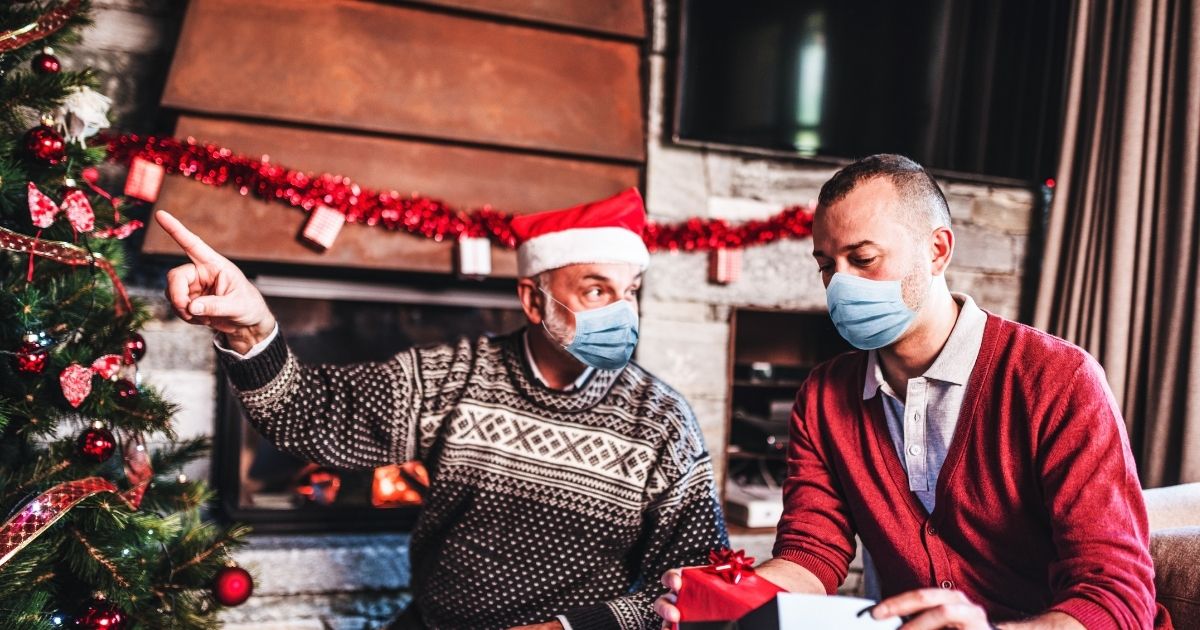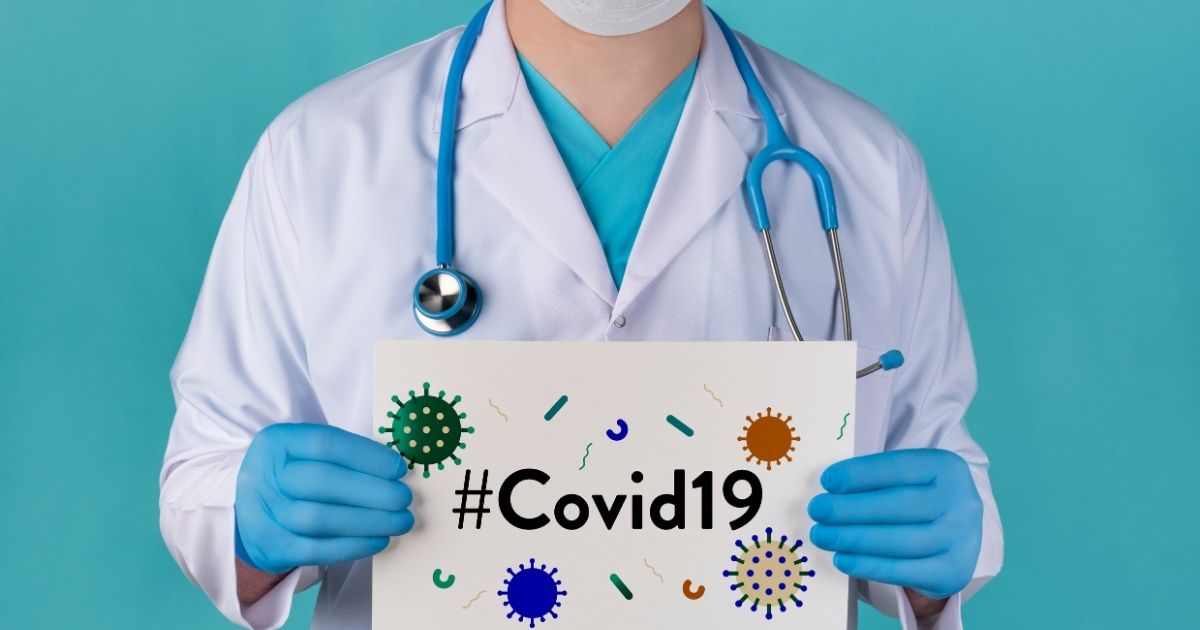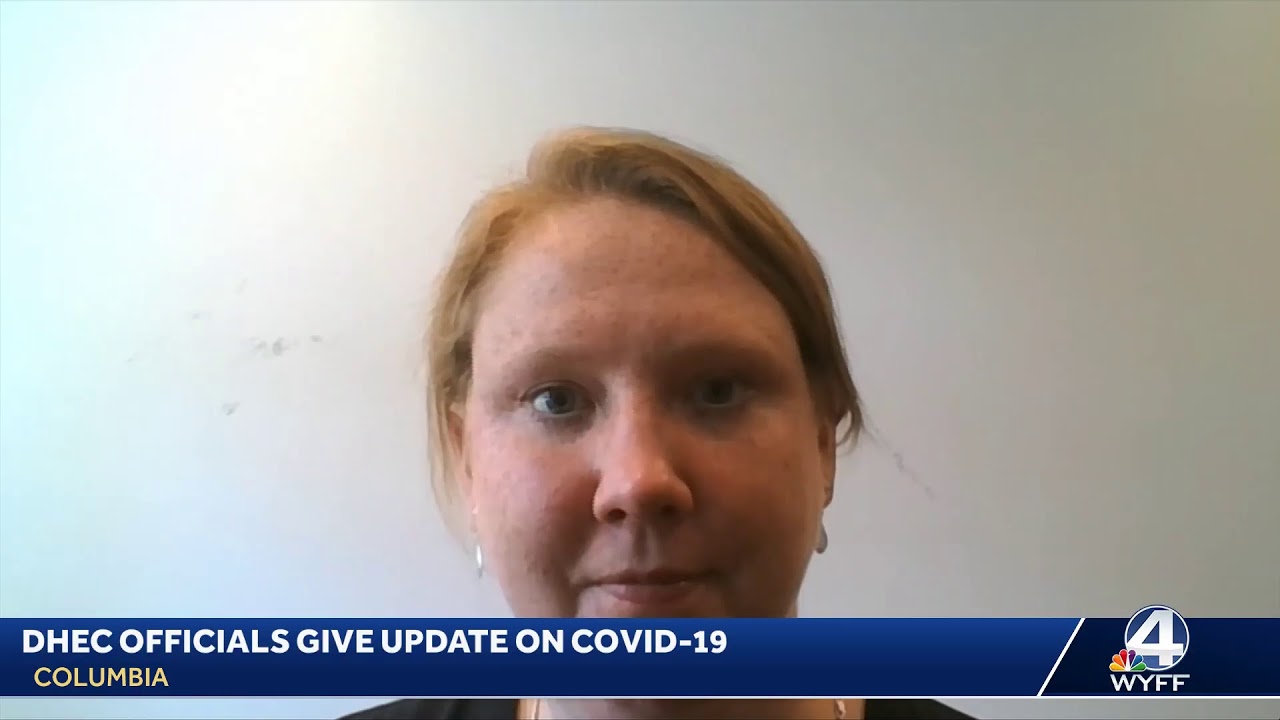Looking at the DHEC data for Covid-19 infections in Greenville County, it is easy to see a significant rise after the Thanksgiving holiday and natural to worry about a similar post-Christmas surge in Covid-19 infections. While no one measure is enough to prevent the spread of COVID-19. The more prevention measures that you put in place, the safer your gathering will be.
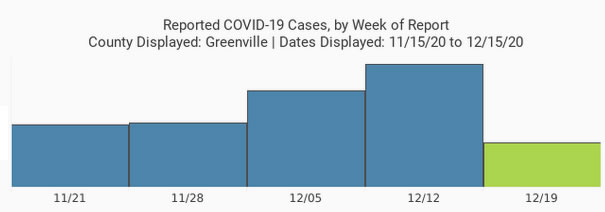
A look at where things stand in Greenville County
Nationally, America has seen 1,485,010 new Covid-19 Cases in the past seven days alone and Greenville has averaged over 2400 new cases in each of the past three weeks. A closer look at the numbers reveals the sharp rise in Covid-19 infections after families gathered for Thanksgiving.
Greenville Covid-19 Cases Pre-Thanksgiving
In the week prior to Thanksgiving, Greenville County reported 1526 new Covid-19 infections. This infection rate held steady going into the Thanksgiving holiday with 1567 cases reported for the week ending November 28th.
Covid-19 Cases Rose 96% After Thanksgiving Holiday
However, for the week ending December 5th, Greenville County new Covid-19 infections raised significantly to 2356 and exploded to over 3000 new cases for the week ending December 12th.
Over the past 5 days, Greenville’s infection rate appears to be holding these new higher levels as DHEC reports 1972 new infections in Greenville County since December 13th.
Unfortunately, these higher infection rates have also lead to an increase in deaths in Greenville County with weekly death totals almost doubling since early November.
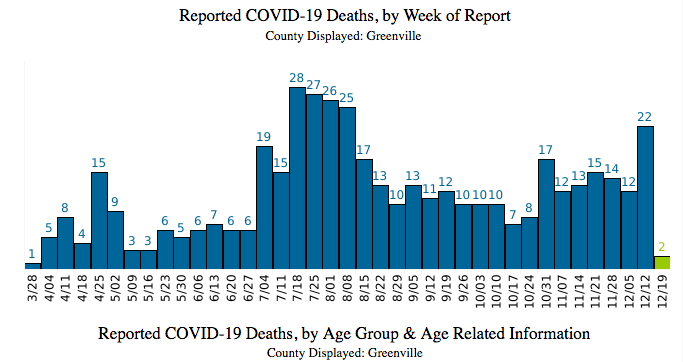
Please enjoy the holidays and be safe this Christmas Season
A post-Christmas surge in Covid-19 cases does not have to be an inevitability but it will take action on everyone’s part to be safe this holiday season. It is imperative that we all act in ways that protect the people we hold dearest.

Prisma Health CMO Answers Your Questions About the COVID-19 Vaccine
Here’s CDC Guidance for 2020 Holiday Events
Considerations for Attending or Hosting a Small Gathering
Below are some general considerations for hosting a gathering that brings together people from different households. Guests should be aware of these considerations and ask their host what mitigation measures will be in place during the gathering. Hosts should consider the following:
- Check the COVID-19 infection rates in areas where attendees live on state, local, territorial, or tribal health department websites or on CDC’s COVID Data Tracker County View. Based on the current status of the pandemic, consider if it is safe to hold or attend the gathering on the proposed date.
- Limit the number of attendees as much as possible to allow people from different households to remain at least 6 feet apart at all times. Guests should avoid direct contact, including handshakes and hugs, with others not from their household.
- Host outdoor rather than indoor gatherings as much as possible. Even outdoors, require guests to wear masks when not eating or drinking.
- Avoid holding gatherings in crowded, poorly ventilated spaces with persons who are not in your household.
- Increase ventilation by opening windows and doors to the extent that is safe and feasible based on the weather, or by placing central air and heating on continuous circulation.
- For additional information on increasing ventilation, visit CDC’s information on Cleaning and Disinfecting Your Home.
- Winter weather can be cold, wet, and unpredictable. Inclement weather makes it difficult to increase ventilation by opening windows or to hold an event outdoors.
- If setting up outdoor seating under a pop-up open air tent, ensure guests are still seated with physical distancing in mind. Enclosed 4-wall tents will have less air circulation than open air tents. If outdoor temperature or weather forces you to put up the tent sidewalls, consider leaving one or more sides open or rolling up the bottom 12 inches of each sidewall to enhance ventilation while still providing a wind break.
- Require guests to wear masks. At gatherings that include persons of different households, everyone should always wear a mask that covers both the mouth and nose, except when eating or drinking. It is also important to stay at least 6 feet away from people who are not in your household at all times.
- Encourage guests to avoid singing or shouting, especially indoors. Keep music levels down so people don’t have to shout or speak loudly to be heard.
- Encourage attendees to wash their hands often with soap and water for at least 20 seconds. If soap and water are not readily available, use hand sanitizer that contains at least 60% alcohol.
- Provide guests information about any COVID-19 safety guidelines and steps that will be in place at the gathering to prevent the spread of the virus.
- Provide and/or encourage attendees to bring supplies to help everyone to stay healthy. These include extra masks (do not share or swap with others), hand sanitizer that contains at least 60% alcohol, and tissues. Stock bathrooms with enough hand soap and single use towels.
- Limit contact with commonly touched surfaces or shared items, such as serving utensils.
- Clean and disinfect commonly touched surfaces and any shared items between use when feasible. Use EPA-approved disinfectantsexternal icon.
- Use touchless garbage cans if available. Use gloves when removing garbage bags or handling and disposing of trash. Wash hands after removing gloves.
- Plan ahead and ask guests to avoid contact with people outside of their households for 14 days before the gathering.
- Treat pets as you would other human family members – do not let pets interact with people outside the household.
“You don’t have to cancel things, you can still spend time with your family. I’m just asking people to be careful when it comes to travel that may not be necessary, travel that you can avoid, and when you get together, try to make some limitation to it.”
Dr. Anthony Fauci
The following people should not attend in-person holiday gatherings:
People with or exposed to COVID-19
Do not host or participate in any in-person gatherings if you or anyone in your household
- Has been diagnosed with COVID-19 and has not met the criteria for when it is safe to be around others
- Has symptoms of COVID-19
- Is waiting for COVID-19 viral test results
- May have been exposed to someone with COVID-19 in the last 14 days
- Is at increased risk of severe illness from COVID-19
Do not host or attend gatherings with anyone who has COVID-19 or has been exposed to someone with COVID-19 in the last 14 days.
People at increased risk for severe illness
If you are an older adult or person with certain medical conditions who is at increased risk of severe illness from COVID-19, or live or work with someone at increased risk of severe illness, you should avoid in-person gatherings with people who do not live in your household.
Food and drinks at small holiday gatherings
Currently, there is no evidence to suggest that handling food or eating is associated with directly spreading COVID-19. It is possible that a person can get COVID-19 by touching a surface or object, including food, food packaging, or utensils that have the virus on it and then touching their own mouth, nose, or possibly their eyes. However, this is not thought to be the main way that the virus is spread. Remember, it is always important to follow food safety practices to reduce the risk of illness from common foodborne germs.
- Encourage guests to bring food and drinks for themselves and for members of their own household only; avoid potluck-style gatherings.
- Wear a mask while preparing food for or serving food to others who don’t live in your household.
- All attendees should have a plan for where to store their mask while eating and drinking. Keep it in a dry, breathable bag (like a paper or mesh fabric bag) to keep it clean between uses.
- Limit people going in and out of the areas where food is being prepared or handled, such as in the kitchen or around the grill, if possible.
- Have one person who is wearing a mask serve all the food so that multiple people are not handling the serving utensils.
- Use single-use options or identify one person to serve sharable items, like salad dressings, food containers, plates and utensils, and condiments.
- Make sure everyone washes their hands with soap and water for 20 seconds before and after preparing, serving, and eating food and after taking trash out. Use hand sanitizer that contains at least 60% alcohol if soap and water are not available.
- Designate a space for guests to wash hands after handling or eating food.
- Limit crowding in areas where food is served by having one person dispense food individually to plates, always keeping a minimum of a 6-foot distance from the person whom they are serving. Avoid crowded buffet and drink stations.
- Change and launder linen items (e.g., seating covers, tablecloths, linen napkins) immediately following the event.
- Offer no-touch trash cans for guests to easily throw away food items.
- Wash dishes in the dishwasher or with hot soapy water immediately following the gathering.
Travel and Overnight Stays
Travel may increase your chance of getting and spreading COVID-19. Postponing travel and staying home is the best way to protect yourself and others this year.
If you are considering traveling, here are some important questions to ask yourself and your loved ones beforehand. These questions can help you decide what is best for you and your family.
- Are you, someone in your household, or someone you will be visiting at increased risk for getting very sick from COVID-19?
- Are cases high or increasing in your community or your destination? Check CDC’s COVID Data Tracker for the latest number of cases.
- Are hospitals in your community or your destination overwhelmed with patients who have COVID-19? To find out, check state and local public health department websites.
- Does your home or destination have requirements or restrictions for travelers? Check state and local requirements before you travel.
- During the 14 days before your travel, have you or those you are visiting had close contact with people they don’t live with?
- Do your plans include traveling by bus, train, or air which might make staying 6 feet apart difficult?
- Are you traveling with people who don’t live with you?
If the answer to any of these questions is “yes,” you should consider making other plans, such as hosting a virtual gathering or delaying your travel.
The safest thing to do is to stay home, but if you do decide to travel, testing can help you do so more safely. Testing does not eliminate all risk, but it can help make travel safer.
It’s important to talk with the people you live with and your family and friends about the risks of traveling.
If you decide to travel, follow these safety measures during your trip to protect yourself and others from COVID-19:
- Wear a mask in public settings, like on public and mass transportation, at events and gatherings, and anywhere you will be around people outside of your household.
- Avoid close contact by staying at least 6 feet apart (about 2 arm lengths) from anyone who is not from your household.
- Wash your hands often with soap and water for at least 20 seconds or use hand sanitizer (with at least 60% alcohol).
- Avoid contact with anyone who is sick.
- Avoid touching your face mask, eyes, nose, and mouth.
Travel can increase the chance of getting and spreading the virus that causes COVID-19. Staying home is the best way to protect yourself and others. Use information from the following webpages to decide whether to travel during the holidays:
- Travel During the COVID-19 Pandemic
- Know Your Travel Risk
- Know When to Delay Your Travel to Avoid Spreading COVID-19
- Considerations for traveling overnight
- Travel Planner
Considerations for staying overnight or hosting overnight guests
Consider whether you, someone you live with, or anyone you plan to visit with is at increased risk for severe illness from COVID-19, to determine whether to stay overnight in the same residence or to stay elsewhere. College students who travel to visit family or friends should be thought of as overnight guests. They and their hosts, which might include their own parents, should follow all overnight guest precautions to protect themselves for the duration of the visit. For longer visits, after 14 days of following guest precautions, the student, if without symptoms or recent contacts with anyone with COVID-19, can be considered a household member and follow steps to protect themselves and others.
- Assess risk for infection based on how you or your visitor will travel.
- Consider and prepare for what you will do if you, or someone else, becomes sick during the visit. What are the plans for isolation, medical care, basic care, and travel home?
Tips for staying overnight or hosting overnight guests
- Visitors should launder clothing and masks, and stow luggage away from common areas upon arrival.
- Wash hands with soap and water for at least 20 seconds, especially upon arrival.
- Wear masks while inside the house. Masks may be removed for eating, drinking, and sleeping, but individuals from different households should stay at least 6 feet away from each other at all times.
- Improve ventilation by opening windows and doors or by placing central air and heating on continuous circulation.
- Spend time together outdoors. Take a walk or sit outdoors at least 6 feet apart for interpersonal interactions.
- Avoid singing or shouting, especially indoors.
- Treat pets as you would other human family members – do not let pets interact with people outside the household.
- Monitor hosts and guests for symptoms of COVID-19 such as fever, cough, or shortness of breath.
- Hosts and guests should have a plan for what to do if someone becomes sick.

